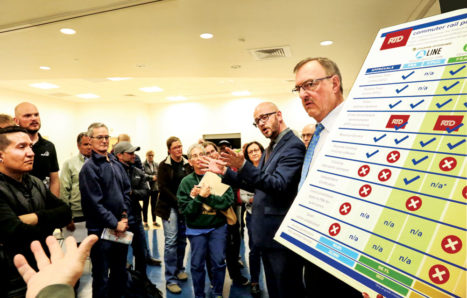
Workers continue to monitor A-Line crossings and trains continue to sound horns day and night. At an RTD public meeting on Oct. 23, locals pressed for an answer when the horns will end.
RTD told a crowd of frustrated area residents that implementation of a quiet zone along the A Line rail corridor now depends on action by the Colorado Public Utilities Commission (PUC). An open house hosted by RTD Oct. 23 was structured to address a wide range of issues including status of the B and G Lines. Local residents ignored those issues and instead huddled around RTD spokesmen Nate Currey and Scott Reed with one basic question—when will the A Line trains be allowed to stop blowing their warning horns?
The good news, according to Currey, is that RTD recently secured approval of its Positive Train Control (PTC) system from the Federal Railroad Administration (FRA).
The FRA decision occurred on Sept. 28, the day after the PUC rejected RTD’s application for approval of three of the 12 street crossings. RTD was requesting authority to add 15 seconds to the federal standard minimum warning time of 20 seconds. PUC “orders” explaining the rejection were issued October 25. In a communication that day to board members, RTD General Manager David Genova said, “The orders do include a process for us to request a rehearing and submit additional information which we will be doing…At this time we are uncertain of the timeframe for the rehearing process.”
So, the bad news is that no one knows at this point what the PUC will ultimately decide or when that decision might be made. Currey said he has no explanation for the PUC’s rejection of the RTD applications but did comment that the PUC commissioners appear to be “not well informed” about commuter rail systems in the sense of not having as much information as the FRA.

RTD spokesmen Nate Currey (arms outstretched) and Scott Reed explain to area residents the steps remaining to achieve an A Line quiet zone.
Once PUC approval is obtained, the quiet zone applications prepared by Denver and Aurora could be acted on within 60 to 90 days. Upon approval of a quiet zone by the FRA, trains (both commuter and freight) will be allowed to travel through the at-grade crossings without sounding the LONG-LONG-SHORT-LONG horns that have plagued the A Line since testing began late 2015.
Open house attendees complained of not being able to sleep through the night. Some questioned whether a class action lawsuit is an appropriate course of action, and others asked rhetorically whether RTD would pay to upgrade their homes’ windows to block the horn noise.
Speaking off the record, an RTD employee opined that the two agencies, which operate independently of each other, seemed to be reluctant to be the first to approve the first-ever PTC designed from the ground up for a new rail facility since it could set the template for PTC nationally. PTC was mandated by the National Transportation Safety Board as a failsafe train collision avoidance system in a 2008 decision following a fatal train crash in California.
Unhappy residents likened the A Line PTC to Denver’s costly experience with a computerized DIA baggage system that never functioned properly.
A Line Also Impacts Bridge-widening Project: A project to widen the Central Park Blvd. bridge will be delayed at least a month as RTD and the Park Creek Metro District (PCMD) negotiate cost-sharing on a new switch required to minimize the “bus bridge” required during construction. Because of the high voltage and proximity of the train’s catenary line to the new construction, power must be shut down under the bridge during critical construction sequences occurring in and around the A Line right-of-way. This may occur 25 times during construction. Buses will bridge the gap in service caused by the closure as patrons are shuttled between stations. Without the new isolation switch at the construction site, the bus bridge would extend from the Colorado station all the way to DIA. The new switch would shorten the bus bridge from Colorado to Peoria. A cost estimate for the switch is still being developed but is expected to be in the low six figures. The total bridge widening project cost is $8.4 million.
The project adds two traffic lanes and a second pedestrian walk over the UPRR tracks and the RTD A Line. Bridge approaches will also be widened. The construction schedule is approximately 12 months. Construction was originally slated to begin in November.
Timing and durations of these A Line shut-downs will be coordinated between RTD, its private contractor Denver Transit Partners, the bridge contractor Kraemer North America LLC and the PCMD’s construction manager, Mortenson Construction.
PCMD is the Stapleton special district charged with designing and constructing major infrastructure in the former airport. PCMD says the city and RTD are negotiating how the switch will be paid for and that it is “likely that some cost will be borne by the project.”



0 Comments